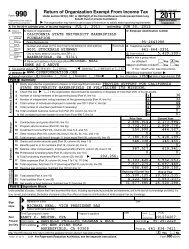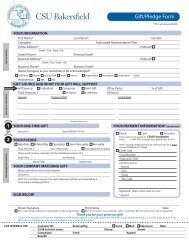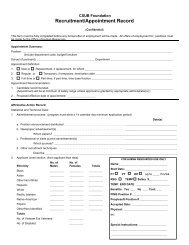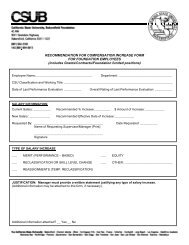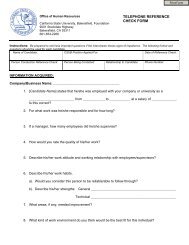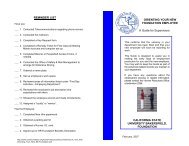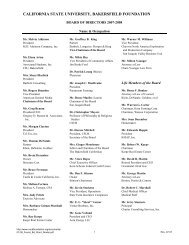FLSA - CSUB Foundation
FLSA - CSUB Foundation
FLSA - CSUB Foundation
You also want an ePaper? Increase the reach of your titles
YUMPU automatically turns print PDFs into web optimized ePapers that Google loves.
When an employee spends less than the majority of his/her time pursuing the profession, the learned professional<br />
exemption may still be met, depending on the relative importance of the professional duties as opposed to the other<br />
types of duties, the frequency with which the employee exercises discretionary powers, the employee’s relative<br />
freedom from supervision and the relationship between the employee’s salary and the wages paid to other<br />
employees who perform the same kind of non-exempt work.<br />
11<br />
Fields of science or learning include law, medicine, theology, actuarial computation, engineering, architecture,<br />
teaching, various types of physical, chemical and biological sciences, pharmacy and other occupations that have a<br />
recognized professional status and are distinguishable from the mechanical arts or skilled trades where the<br />
knowledge could be of a fairly advanced type, but is not in a field of science or learning.<br />
12<br />
The learned professional exemption is restricted to professions where specialized academic training is a<br />
standard prerequisite for entrance into the profession (e.g., an Engineering degree is required to be a Facilities<br />
Construction Engineer). However, the word “customarily” means the exemption may be available to employees in<br />
such professions who have substantially the same knowledge level and perform substantially the same work as the<br />
degreed employees, but who attained the advanced knowledge through a combination of work experience and<br />
intellectual instruction.<br />
The learned professional exemption does not apply to occupations in which employees acquire their skill by<br />
experience rather than by advanced specialized intellectual instruction. The learned professional exemption is not<br />
available for occupations that may be performed with only the general knowledge acquired by an academic degree in<br />
any field, knowledge acquired through an apprenticeship, or training in the performance of routine mental, manual,<br />
mechanical or physical processes. The exemption also does not apply to occupations in which employees acquire<br />
skill by experience.<br />
13<br />
For the creative professional exemption, work performed must be “in a recognized field of artistic or creative<br />
endeavor” including such fields as music, writing, acting, graphic design, etc. The creative professional exemption<br />
generally is not met by a person employed as a copyist, graphic arts technician, animator, or retoucher of<br />
photographs since such work is not properly described as creative in character.<br />
http://www.csubfoundation.org/humanresources/documents/classify_compensate/<strong>FLSA</strong>_SHRM_Worksheet.pdf



